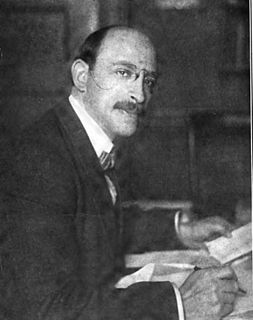A Quote by Nikolai Berdyaev
There is absolute truth in anarchism and it is to be seen in its attitude to the sovereignty of the state and to every form of state absolutism. [...] The religious truth of anarchism consists in this, that power over man is bound up with sin and evil, that a state of perfection is a state where there is no power of man over man, that is to say, anarchy. The Kingdom of God is freedom and the absence of such power... the Kingdom of God is anarchy.
Related Quotes
It is unfortunately none too well understood that, just as the State has no money of its own, so it has no power of its own. All the power it has is what society gives it, plus what it confiscates from time to time on one pretext or another, there is no other source from which State power can be drawn. Therefore every assumption of State power, whether by gift or seizure leaves society with so much less power; there is never, nor can be, any strengthening of State power without a corresponding and roughly equivalent depletion of social power.
It is marriage, perhaps, which had given man the best of his freedom, given him his little kingdom of his own within the big kingdom of the state.... It is a true freedom because it is a true fulfilment, for man, woman and children. Do we then want to break marriage? If we do break it, it means we all fall to a far greater extent under the direct sway of the State.
[T]he mass-man sees in the State an anonymous power, and feeling himself, like it, anonymous, he believes that the State is something of his own. Suppose that in the public life of a country some difficulty, conflict, or problem presents itself, the mass-man will tend to demand that the State intervene immediately and undertake a solution directly with its immense and unassailable resources. This is the gravest danger that to-day threatens civilisation: State intervention; the absorption of all spontaneous social effort by the State.
Louis XIV was very frank and sincere when he said: I am the State. The modern statist is modest. He says: I am the servant of the State; but, he implies, the State is God. You could revolt against a Bourbon king, and the French did it. This was, of course, a struggle of man against man. But you cannot revolt against the god State and against his humble handy man, the bureaucrat.
Faith stands or falls on the truth that the future with God is more satisfying than the one promised by sin. Where this truth is embraced and God is cherished above all, the power of sin is broken. The power of sin is the power of deceit. Sin has power through promising a false future. In temptation sin comes to us and says: "The future with God on his narrow way is hard and unhappy, but the way I promise is pleasant and satisfying." The power of sin is in the power of this lie.
In this state one enriches everything out of one's own fullness: whatever one sees, whatever wills is seen swelled, taut, strong, overloaded with strength. A man in this state transforms things until they mirror his power—until they are reflections of his perfection. This having to transform into perfection is—art.
Men in great place are thrice servants; servants of the sovereign state, servants of fame, and servants of business; so as they have no freedom, neither in their persons, nor in their actions, nor in their times. It is a strange desire to seek power and to lose liberty; or to seek power over others, and to lose power over a man's self.
No doubt that anarchist ideas are frightening to those in power. People in power can tolerate liberal ideas. They can tolerate ideas that call for reforms, but they cannot tolerate the idea that there will be no state, no central authority. So it is very important for them to ridicule the idea of anarchism to create this impression of anarchism as violent and chaotic. It is useful for them.
I will not cede more power to the state. I will not willingly cede more power to anyone, not to the state, not to General Motors, not to the CIO. I will hoard my power like a miser, resisting every effort to drain it away from me. I will then use my power, as I see fit. I mean to live my life an obedient man, but obedient to God, subservient to the wisdom of my ancestors; never to the authority of political truths arived at yesterday at the voting booth. That is a program of sorts, is it not? It is certainly program enough to keep conservatives busy, and Liberals at bay. And the nation free.
The sovereignty of the state as the power that protects the individual and that defines the mutual relationships among the visible spheres, rises high above them by its right to command and compel. But within these spheres ... another authority rules, an authority that descends directly from God apart from the state. This authority the state does not confer but acknowledges.








































